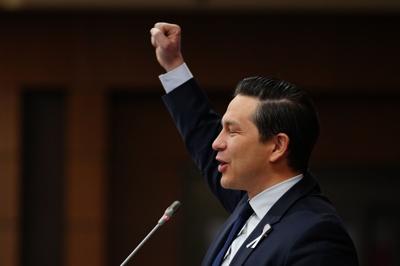Most politicians are in the business of telling voters what they want to hear.
But some political parties just want to stay in business — without listening to what voters are telling them.
Progressives are a big part of the problem.
New Democrats, Liberals and Greens are so set on their own ways — and going their own way — that they can’t see their way to coming together as a single party. By contrast, right-wing parties — notably the old Reform Party, Canadian Alliance and Progressive Conservatives — have long understood the imperative to unite the right under the umbrella of the Conservative Party of Canada.
Why not respond by rebranding as the combined Liberal Democrats? Rather than unite to fight the right, the centre-left clings to its partisan and picayune divisions — splitting the progressive vote every which way while allowing Tories to triumph with majority governments based on a minority of votes.
In my previous column at year-end, looking ahead to the next two years of electioneering in Canada, I predicted that progressive parties will continue to put their own vested interests ahead of the national and provincial interest. Given how similar they are ideologically, I called it the vanity and inanity of small differences.
The reaction from readers and tweeters suggests I’m hardly alone in worrying about the outlook. So in my first column of the new year, I’d like to give voters their say, both from my email inbox and the Star’s letters page.
“It seems ludicrous that the vote on the right side of the political spectrum is always united while the vote on the left side is always split in two,” wrote Scott Kennedy.
You might be interested in
With national elections expected by 2025, the polls show Conservative Leader Pierre Poilievre on track to become Canada’s next prime minister. With an Ontario vote coming in 2026, polling suggests Doug Ford will be re-elected easily as premier for another four years after two full terms in power.
Proportional representation could reduce vote-splitting, but PR proposals keep failing in one referendum after another (most recently in Ontario in 2007). Electoral reform won’t be on the agenda anytime soon, which is why I raised the idea of uniting Liberals and New Democrats as a thought experiment.
“About time someone suggested uniting the left,” wrote Frank White. “We are never going to get PR so let’s have the next best thing.”
It’s not enough to work together after the fact in a minority Parliament, as Liberals and New Democrats have with their confidence and supply arrangement — an informal alliance by which the NDP agrees not to defeat the governing Liberals in exchange for enacting shared goals such as denticare and pharmacare. If Liberals and New Democrats keep splitting the progressive vote in close three-way fights, the Tories could win many more ridings next time.
Patrick J. Mullin, who worked for a Liberal MP in the 1990s, told me about his conversation on Parliament Hill with “the young Reform MP Stephen Harper … about the problem (of) the right splitting the vote to let the Liberals in under Jean Chrétien.” Ever since, Mullin said, he has “pushed bringing the Liberals and NDP and maybe Greens.”
But the quintessential Canadian conundrum persists, election after election: Progressives would rather fight than unite.
Matthew Lebo, chair of the political science department at Western University, reached out to describe his surprise after teaching for two decades in the U.S. that Canadian progressives persist in pummelling one another.
“For comparison, the ideological breadth of the American Democratic Party would easily hold the NDP, the Liberals and the Canadian Green Party,” he wrote in an email. "To beat the Republican Party, they need to be in the same party. Even Bernie Sanders understood that when he lined up behind Biden in 2016.”
In the U.S., Lebo likes to say, “the point of political participation is to keep your least favourite major party from winning. When I say that in Canada, people get mad. Canadians seem to feel everyone should have a party very close to them ideologically.”
The result is that the right wing wins. Yet progressives persist in depriving themselves of power.
Another potential benefit to uniting the left is that the right would be forced to broaden its appeal toward the centre, rather than always pandering to its base.
“Now, the Conservatives know that they can win a majority with about 37 per cent of the vote,” he argues. “To get there, they can ignore the political centre — they just need to keep the right united. But a New Liberal Democratic Party would force the Conservatives to adapt and moderate.”
While the letters and emails in response to my thought experiment were thoughtful and positive, it’s worth mentioning the tidal wave of hate, hostility, vulgarisms and venom that the column inspired on social media from self-styled right wingers. No matter — it’s hard to take X seriously these days, especially on holidays — and one can’t posit that small-minded trolls are representative of Tories at large, just as letter writers aren’t especially reflective of the electorate.
That said, scrolling through the screeds — a feeding frenzy of algorithmic apoplexy in the thousands — I couldn’t help thinking that the mere thought of a united left had unleashed a torrent of terror among trolls of the far-right. All the more reason for the left to get its act together.













Anyone can read Conversations, but to contribute, you should be a registered Torstar account holder. If you do not yet have a Torstar account, you can create one now (it is free).
To join the conversation set a first and last name in your user profile.
Sign in or register for free to join the Conversation